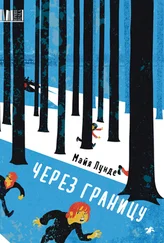My mouth watered. I’d been saving the package of biscuits for the way home. Now I had nothing.
I tried getting on my feet, but they gave out from under me. My muscles burned. I tried again, supporting myself against the wall, and this time I succeeded.
Step by step I walked over to the closest gate, pushed at it carefully. The movement produced a thunderous sound in the metal.
Inside there was an empty courtyard. Leaves had been blown into small piles in the corners. On both of the long sides there was a door. I tried one of them.
It led to an entrance, a cramped, narrow stairway. The day was sliding away out there, just a few small cracks in the wall admitted the dwindling twilight onto the steps.
I limped up the stairs. Every step hurt, but my breathing was no longer as heavy. I came up to the second floor. A door on either side. I tried the closest one. It was locked. I continued across the landing and stopped. Then I tried again, pushed the handle down. The expectation of meeting the same resistance was in my hand, so I jumped when the door slid open.
I stood there. The odor of the flat spread out into the staircase, hitting me. There was nothing special about it, but all homes have their own smell. The smell of the people who live there. The food they have eaten, the clothes they have washed, the shoes they have worn, the sweat they have secreted, the breath they have exhaled during the late-night hours—the rank smell from sleeping people’s mouths—bedding that perhaps should have been changed, a frying pan that should have been washed, but left for the next day, so the food residue had congealed and started to decay.
But now only the shadow of all the smells remained, almost hidden by the massive stuffiness.
I stepped across the doorway. The flat was small, just two rooms. Like our flat, Kuan’s and mine. Perhaps this had also housed a small family of three. A bedroom towards the courtyard, a combined sitting room and kitchen facing the street.
I closed the door behind me and walked into the sitting room. It was virtually empty, vacated, although the largest furnishings had clearly been left behind. A frayed corner sofa that was a little too big and covered with gray fabric loomed, taking up almost half the floor. An old, warped chest of drawers painted black stood against the opposite wall.
I searched quickly through the kitchen cupboards. I couldn’t stop myself, even though I knew they would be empty. Just a large, worn pot was placed at the bottom of a cupboard. Otherwise nothing.
The chest of drawers was also empty, except for some old cables and a telephone with a cracked dial pad in the bottom drawer.
Then I walked into the bedroom. The closets gaped, the doors seemed to have been opened randomly, as if somebody hadn’t had time to close them after they were emptied. On the walls were some empty nails, and the shadow of the pictures that had once hung there.
A narrow double bed was placed along one of the bedroom walls. Just a mattress, the blankets and pillows were gone. They had slept there, read, argued, laughed, made love. Where were they now? Still together?
Along the other wall was a child’s bed. It could have belonged to a child of preschool age, was longer than a cot, shorter than an adult bed. It could have belonged to Wei-Wen. A small pillow was left behind. There was a dent in the middle, where a head had rested.
Suddenly my legs gave out from under me. I collapsed onto the child’s bed, remained seated for a few seconds. Not a soul, just me, for miles around. Everything was abandoned. Empty. And I was just as abandoned as this flat.
No.
A craving in my chest. Was it yearning? I’d barely thought about Kuan, avoided it, held him at a distance, every time his face popped up in my brain, I forced it away. Forced myself to think just about Wei-Wen, about finding my child.
I stood up, went back to the sitting room, pulled the telephone out of the cupboard and looked around me quickly. There, beside the sofa, was a telephone jack. It couldn’t be connected, not here, so far away from everything.
I rushed over and shoved in the plug. Then I lifted the receiver.
A faint dial tone could be heard.
Quickly I dialed my home number on the cracked dial pad.
At first all I could hear was a crackling sound, noiseless signals being sent mile after mile through old, virtually crumbling cables.
And then it rang.
Once.
Soon a voice would fill me, Kuan’s voice. I had no plan for what I would say, just had to hear him.
Twice.
Because perhaps there still was an “us.” Perhaps there could be, now that there was such a great distance between us.
Three times.
Wasn’t he there?
The seconds passed.
Four times.
But then.
“Hello?”
His voice in my ear.
I gasped with relief. “Hi.”
“Tao!”
I couldn’t answer, tried to hold back my sobs, but they forced their way out.
“What is it? Has something happened?”
“I’m… I don’t know where I am.”
“What do you mean?”
“There’s nobody here.”
The sound became scratchy, the signals disappeared.
“Kuan? No!”
The telephone hummed faintly. Then the line went dead.
I tried again, dialed his number. Waited.
Nothing.
I took out the plug, put it in again.
The telephone remained silent.
I put the receiver in place, put it down on the floor. I stood up and looked down at it.
Suddenly my foot jerked out and kicked with all of its might. Again and again. The old electronics flew in all directions, along with cracked pieces of plastic.
Then I went into the bedroom, and over to the child’s bed.
I remained sitting there, while the room grew dark. The feeling of loneliness hit me so hard that I gasped. The moment became everything, the moment was an eternity. Me, alone in an abandoned flat. There was nothing else. I had lost everything. Even the money was gone.
Our second child. Who would it have been? Another boy? A girl? Like me? Awkward, calm, one of the outsiders. I would never get to know this child. I had sacrificed it, and nothing was left. Life stopped here.
I lay down on my side, pulling my legs up beneath me. Blindly I found the little pillow, grasped it, pulled it against me, embraced it, pressed it against my body, against my breast.
That’s how I fell asleep.
Wei-Wen’s hair smelled of a child’s sweat and something dry, like sand. I pressed my lips against it, captured a few strands of hair with them and tugged a little.
“Ouch, Mommy. You’re eating my hair!” I released the strands and laughed. Found his cheek and put my mouth against it instead. So soft, surprisingly soft, such soft cheeks children can have. It was as if I could press my lips against them and never, no matter how hard I pressed, encounter resistance. Just lie like this and have all the time in the world.
“My baby. You’re so sweet.”
He sniffled vigorously in response. Stared at the ceiling, where some fluorescent star stickers made up the solar system. I’d had them myself when I was a little girl, had begged for them, when my parents actually wanted to buy a doll. So when I grew up and moved out on my own, I carefully picked them off the ceiling of my childhood bedroom. I put them in a bag, packed them in the very bottom of a suitcase of childhood memorabilia, and when Wei-Wen was finally born, stuck them up again. It was as if I’d created a bond between my own childhood and his, between us and the world, between the world and the universe.
I’d helped him to learn the names of all the planets by heart, so he would understand how small we were—that we were also a part of something larger even though he was still much too young to take it in. The stars and the planets were still just stickers up there on the ceiling. He could only understand that the moon and the sun really existed because he saw them in the sky with his own eyes. But that the moon didn’t even have its own sticker, hadn’t been worthy of it, up there on the ceiling, that he couldn’t understand. It was almost as big as the sun.
Читать дальше









